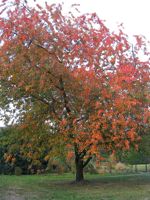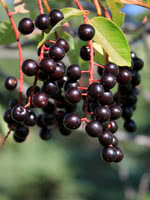Mon-Fri 9am - 5pm Mountain time
Western Chokecherry vs Black Cherry
Prunus serotina
Prunus virginiana var. demissa
NOT AVAILABLE THIS SEASON - MIGHT RETURN
Black Cherry is common in eastern North America but a rare find elsewhere. This tree is shade tolerant and is often found in old fields, forest openings, and along fencerows.
The fruit is edible and is commonly used to flavor rum and brandy. It is also edible and often eaten fresh or used in wine or jelly. Black Cherry trees typically begin producing fruit when they are 10 years of age.
Black Cherry wood is a rich reddish-brown color and is strong, making it valued in cabinetry and woodworking. It is often used in reclamation as well.
The leaves can poison livestock as they contain cyanide derivatives and precursors. However, many have noted that deer still seem to browse their trees with impunity and birds and other animals eat the fruit when available.
Western Chokecherry is a shrub or small tree commonly used for farmstead and field windbreaks.
It produces white flowers in the spring and edible dark purple fruit that matures between September and October. Its cherries are great for making for making jams, jellies or wine, but are not very palatable for raw eating.

